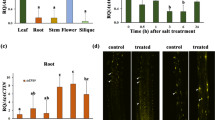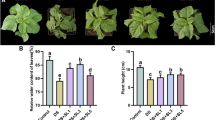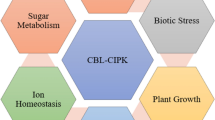Abstract
SnRK2 protein kinases have been demonstrated to have an important effect on the physiological processes of plant stress tolerance. Here, one of the SnRK2 family members, designated AsSnRK2D, was isolated from oat (Avena sativa Linn. L.). The AsSnRK2D protein includes functional domains specific to the SnRK2 family. The AsSnRK2D protein and its 12 and 21 counterparts were classified into Group II and SnRK2a, respectively. The AsSnRK2D gene was constitutively expressed and positively responded to abscisic acid, low-temperature, salt, and dehydration stress. The subcellular localization analysis revealed that the AsSnRK2.7 protein was localized primarily in the nucleus. Ectopic expression of the AsSnRK2D gene in tobacco resulted in an improvement in the primary root length and plant fresh weight under dehydration and salt stress. The AsSnRK2D-overexpressing tobacco demonstrated improved tolerance to stress resulting from dehydration and salinity, as supported by the morphological changes, survival rates, and physiological indices, including electrolyte leakage, superoxide dismutase level, catalase activity, chlorophyll yield, relative water content, accumulation of reactive oxygen species such as superoxide anion radical and hydrogen peroxide, and the level of free proline. The AsSnRK2D gene was associated with the stress responses of the transgenic tobacco to dehydration and salinity via the regulation of a series of stress-inducible genes, including dehydrins (NtERD10B, NtERD10D, and NtLEA5), cell signaling components (NtPLC3 and NtCaMK1), transcription factors (NtDREB2 and NtDREB4), antioxidative enzymes (NtMnSOD and NtCAT), and proline biosynthesis (NtP5CS). The results show that the AsSnRK2D gene has certain application potential in improving crop tolerances to dehydration and salinity stress.









Similar content being viewed by others
References
Barrs HD, Weatherley PE (1962) A re-examination of the relative turgidity technique for estimating water deficits in leaves. Aust J Biol Sci 15:413–428. https://doi.org/10.1071/bi9620413
Beers RF, Sizer IW (1952) A spectrophotometric method for measuring the breakdown of hydrogen peroxide by catalase. J Biol Chem 195:133–140. https://doi.org/10.1016/S0074-7696(08)60016-9
Belin C, de Franco PO, Bourboussse C, Chaignepain S, Schmitter JM, Vavasseur A, Giraudat J, Barbier-Brygoo H, Thomine S (2006) Identification of features regulating OST1 kinase activity and OST1 function in guard cells. Plant Physiol 141:1316–1327. https://doi.org/10.1104/pp.106.079327
Boudsocq M, Barbier-Brygoo H, Lauriere C (2004) Identification of nine sucrose nonfermenting 1-related protein kinases 2 activated by hyperosmotic and saline stresses in Arabidopsis thaliana. J Biol Chem 279:41758–41766. https://doi.org/10.1074/jbc.M405259200
Boudsocq M, Droillard MJ, Barbier-Brygoo H, Laurière C (2007) Different phosphorylation mechanisms are involved in the activation of sucrose non-fermenting 1 related protein kinases 2 by osmotic stresses and abscisic acid. Plant Mol Biol 63:491–503. https://doi.org/10.1007/s11103-006-9103-1
Burza AM, Pękala I, Sikora J, Siedlecki P, Malagocki P, Bucholc M, Koper L, Zielenkiewicz P, Dadlez M, Dobrowolska G (2006) Nicotiana tabacum osmotic stress-activated kinase is regulated by phosphorylation on Ser-154 and Ser-158 in the kinase activation loop. J Biol Chem 281:34299–34311. https://doi.org/10.1074/jbc.M601977200
Chae MJ, Lee JS, Nam MH, Cho K, Hong JY, Yi SA, Sun SC, Yoon IS (2007) A rice dehydration-inducible SNF1-related protein kinase 2 phosphorylates an abscisic acid responsive element-binding factor and associates with ABA signaling. Plant Mol Biol 63:151–169. https://doi.org/10.1007/s11103-006-9079-x
Chaves MM, Maroco JP, Pereira JS (2003) Understanding plant responses to drought—from genes to the whole plant. Funct Plant Biol 30:239–264. https://doi.org/10.1071/FP02076
Du X, Zhao X, Li X, Guo C, Lu W, Gu J, Xiao K (2013) Overexpression of TaSRK2C1, a wheat SNF1-related protein kinase 2 gene, increases tolerance to dehydration, salt, and low temperature in transgenic tobacco. Plant Mol Biol Rep 31:810–821. https://doi.org/10.1007/s11105-012-0548-x
Einset J, Per W, Bones A (2007) Ros signaling pathways in chilling stress. Plant Signal Behav 2:365–367. https://doi.org/10.4161/psb.2.5.4461
Fujita Y, Nakashima K, Yoshida T, Katagiri T, Kidokoro S, Kanamori N, Umezawa T, Fujita M, Maruyama K, Ishiyama K, Kobayashi M, Nakasone S, Yamada K, Ito T, Shinozaki K, Yamaguchi-Shinozaki K (2009) Three SnRK2 protein kinases are the main positive regulators of abscisic acid signaling in response to water stress in Arabidopsis. Plant Cell Physiol 50:2123–2132. https://doi.org/10.1093/pcp/pcp147
Gallois P, Marinho P (1995) Leaf disk transformation using Agrobacterium tumefaciens-expression of heterologous genes in tobacco. Methods Mol Biol 49:39–48. https://doi.org/10.1385/0-89603-321-X:39
Halford NG, Hardie DG (1998) SNF1-related protein kinases: global regulators of carbon metabolism in plants? Plant Mol Biol 37:735–748. https://doi.org/10.1023/A:1006024231305
Han L, Liu H, Yu S, Wang W, Liu J (2013) Potential application of oat for phytoremediation of salt ions in coastal saline-alkali soil. Ecol Eng 61:274–281. https://doi.org/10.1016/j.ecoleng.2013.09.034
Heath RL, Packer L (1968) Photoperoxidation in isolated chloroplasts: I. Kinetics and stoichiometry of fatty acid peroxidation. Arch Biochem Biophys 125:189–198. https://doi.org/10.1016/0003-9861(68)90654-1
Hong Z, Lakkineni K, Zhang Z, Verma DPS (2000) Removal of feedback inhibition of Δ1-pyrroline-5-carboxylate synthetase results in increased proline accumulation and protection of plants from osmotic stress. Plant Physiol 122:1129–1136. https://doi.org/10.1104/pp.122.4.1129
Huai J, Wang M, He J, Zheng J, Dong Z, Lv H, Zhao J, Wang G (2008) Cloning and characterization of the SnRK2 gene family from Zea mays. Plant Cell Rep 27:1861–1868. https://doi.org/10.1007/s00299-008-0608-8
Huang C, Verrillo F, Renzone GV, Arena S, Rocco M, Scaloni A, Marra M (2011) Response to biotic and oxidative stress in Arabidopsis thaliana: analysis of variably phosphorylated proteins. J Proteomics 74:1934–1949. https://doi.org/10.1016/j.jprot.2011.05.016
Kobayashi Y, Yamamoto S, Minami H, Kagaya Y, Hattori T (2004) Differential activation of the rice sucrose nonfermenting 1-related protein kinase 2 family by hyperosmotic stress and abscisic acid. Plant Cell 16:1163–1177. https://doi.org/10.1105/tpc.019943
Kulik A, Wawer I, Krzywińska E, Bucholc M, Dobrowolska G (2011) SnRK2 protein kinases-key regulators of plant response to abiotic stresses. OMICS 15:859–872. https://doi.org/10.1089/omi.2011.0091
Kulik A, Anielska-Mazur A, Bucholc M, Koen E, Szymańska K, Żmieńko A, Krzywińska E, Wawer I, McLoughlin F, Ruszkowski D, Figlerowicz M, Testerink C, Skłodowska A, Wendehenne D, Dobrowolska G (2012) SNF1-related protein kinases type 2 are involved in plant responses to cadmium stress. Plant Physiol 160:868–883. https://doi.org/10.1104/pp.112.194472
Laurie S, Halford NG (2001) The role of protein kinases in the regulation of plant growth and development. Plant Growth Regul 34:253–265. https://doi.org/10.1023/a:1013311807626
Livak KJ, Schmittgen TD (2001) Analysis of relative gene expression data using real-time quantitative PCR and the 2−ΔΔCT method. Methods 25:402–408. https://doi.org/10.1006/meth.2001.1262
Lou D, Wang H, Yu D (2018) The sucrose non-fermenting-1-related protein kinases SAPK1 and SAPK2 function collaboratively as positive regulators of salt stress tolerance in rice. BMC Plant Biol 18:203. https://doi.org/10.1186/s12870-018-1408-0
Ma Y, Szostkiewicz I, Korte A, Moes D, Yang Y, Christmann A, Grill E (2009) Regulator of PP2C phosphatase activity function as abscisic acid sensors. Science 324:1064–1068. https://doi.org/10.1126/science.1172408
Mahajan S, Tuteja N (2005) Cold, salinity and drought stresses: an overview. Arch Biochem Biophys 444:139–158. https://doi.org/10.1016/j.abb.2005.10.018
Mao X, Zhang H, Tian S, Chang X, Jing R (2009) TaSnRK2.4, an SNF1-type serine/threonine protein kinase of wheat (Triticum aestivum L.), confers enhanced multistress tolerance in Arabidopsis. J Exp Bot 61:683–696. https://doi.org/10.1093/jxb/erp331
Maszkowska J, Debski J, Kulik A, Kistowski M, Bucholc M, Lichocka M, Klimecka M, Sztatelman O, Szymańska KP, Dadlez M, Dobrowolska G (2019) Phosphoproteomic analysis reveals that dehydrins ERD10 and ERD14 are phosphorylated by SNF1-related protein kinase 2.10 in response to osmotic stress. Plant Cell Environ 42:931–946. https://doi.org/10.1111/pce.13465
Min MK, Choi EH, Kim JA, Yoon IS, Han S, Lee Y, Lee S, Kim BG (2019) Two clade a phosphatase 2Cs expressed in guard cells physically interact with abscisic acid signaling components to induce stomatal closure in rice. Rice 12:37. https://doi.org/10.1186/s12284-019-0297-7
Misra HP, Fridovich I (1972) The role of superoxide anion in the autoxidation of epinephrine and a simple assay for superoxide dismutase. J Biol Chem 247:3170–3175. https://doi.org/10.1007/978-3-0348-6879-2
Miyakawa T, Tanokura M (2011) Regulatory mechanism of abscisic acid signaling. Biophysics 7:123–128. https://doi.org/10.2142/biophysics.7.123
Miyazono K, Miyakawa T, Sawano Y, Kubota K, Kang HJ, Asano A, Miyauchi Y, Takahashi M, Zhi Y, Fujita Y, Yoshida T, Kodaira KS, Yamaguchi-Shinozaki K, Tanokura M (2009) Structural basis of abscisic acid signaling. Nature 462:609–614. https://doi.org/10.1038/nature08583
Mizoguchi M, Umezawa T, Nakashima K, Kidokoro S, Takasaki H, Fujita Y, Yamaguchi-Shinozaki K, Shinozaki K (2010) Two closely related subclass II SnRK2 protein kinases cooperatively regulate drought-inducible gene expression. Plant Cell Physiol 51:842–847. https://doi.org/10.1093/pcp/pcq041
Nakashima K, Yamaguchi-Shinozaki K (2006) Regulons involved in osmotic stress-responsive and cold stress-responsive gene expression in plants. Physiol Plantarum 126:62–71. https://doi.org/10.1111/j.1399-3054.2005.00592.x
Newell MA, Cook D, Tinker NA, Jannink JL (2011) Population structure and linkage disequilibrium in oat (Avena sativa L.): implications for genome-wide association studies. Theor Appl Genet 122:623–632. https://doi.org/10.1007/s00122-010-1474-7
Nishimura N, Hitomi K, Arvai AS, Rambo RP, Hitomi C, Cutler SR, Schroeder JI, Getzoff ED (2009) Structural mechanism of abscisic acid binding and signaling by dimeric PYR1. Science 326:1373–1379. https://doi.org/10.1126/science.1181829
Nishimura N, Sarkeshik A, Nito K, Park SY, Wang A, Carvalho PC, Lee C, Caddell D, Chory J, Yates JR, Schroeder JI (2010) PYR/PYL/RCAR family members are major in vivo ABI1 protein phosphatase 2C-interacting proteins in Arabidopsis. Plant J 61:290–299. https://doi.org/10.1111/j.1365-313X.2009.04054.x
Poku SA, Seçgin Z, Kavas M (2019) Overexpression of Ks-type dehydrins gene OeSRC1 from Olea europaea increases salt and drought tolerance in tobacco plants. Mol Biol Rep 46:5745–5757. https://doi.org/10.1007/s11033-019-05008-x
Rehman SU, Wang J, Chang X, Zhang X, Mao X, Jing R (2019) A wheat protein kinase gene TaSnRK2.9-5A associated with yield contributing traits. Theor Appl Genet 132:907–919. https://doi.org/10.1007/s00122-018-3247-7
Rigoulot SB, Petzold HE, Williams SP, Brunner AM, Beers EP (2019) Populus trichocarpa clade A PP2C protein phosphatases: their stress-induced expression patterns, interactions in core abscisic acid signaling, and potential for regulation of growth and development. Plant Mol Biol 100:303–317. https://doi.org/10.1007/s11103-019-00861-7
Rojo E, Titarenko E, León J, Berger S, Vancanneyt G, Sánchez-Serrano JJ (2010) Reversible protein phosphorylation regulates jasmonic acid-dependent and -independent wound signal transduction pathways in Arabidopsis thaliana. Plant J 13:153–165. https://doi.org/10.1046/j.1365-313x.1998.00020.x
Santiago J, Dupeux F, Round A, Antoni R, Park SY, Jamin M, Cutler SR, Rodriguez PL, Marquez JA (2009) The abscisic acid receptor PYR1 in complex with abscisic acid. Nature 462:665–668. https://doi.org/10.1038/nature08591
Sharma HC, Gill BS (1983) Current status of wide hybridization in wheat. Euphytica 32:17–31. https://doi.org/10.1007/bf00036860
Sheludko YV, Sindarovska YR, Gerasymenko IM, Bannikova MA, Kuchuk NV (2007) Comparison of several nicotiana species as hosts for high-scale agrobacterium-mediated transient expression. Biotechnol Bioeng 96:608–614. https://doi.org/10.1002/bit.21075
Sheppard LJ, Franssen I, Cape JN (1995) Frost hardiness of Norway spruce treated with acid mist. Evaluation of the electrolyte leakage rate technique. Environ Exp Bot 35:139–149. https://doi.org/10.1016/0098-8472(94)00041-3
Shinozaki K, Yamaguchi-Shinozaki K (1997) Gene expression and signal transduction in water-stress response. Plant Physiol 115:327–334. https://doi.org/10.2307/4277903
Soma F, Mogami J, Yoshida T, Abekura M, Takahashi F, Kidokoro S, Mizoi J, Shinozaki K, Yamaguchi-Shinozaki K (2017) ABA-unresponsive SnRK2 protein kinases regulate mRNA decay under osmotic stress in plants. Nat Plants 3:16204. https://doi.org/10.1038/nplants.2016.204
Song X, Yu X, Hori C, Demura T, Ohtani M, Zhuge Q (2016) Heterologous overexpression of poplar SnRK2 genes enhanced salt stress tolerance in Arabidopsis thaliana. Front plant Sci 7:612. https://doi.org/10.3389/fpls.2016.00612
Szymańska K, Polkowska-Kowalczyk L, Lichocka M, Maszkowska J, Dobrowolska G (2019) SNF1-related protein kinases SnRK2.4 and SnRK2.10 modulate ROS homeostasis in plant response to salt stress. Int J Mol Sci 20:143. https://doi.org/10.3390/ijms20010143
Thomashow MF (1999) Plant cold acclimation: freezing tolerance genes and regulatory mechanisms. Annu Rev Plant Biol 50:571–599. https://doi.org/10.1146/annurev.arplant.50.1.571
Torres LF, Reichel T, Déchamp E, de Aquino SO, Duarte KE, Alves GSC, Silva AT, Cotta MG, Costa TS, Diniz LEC, Breitler JC, Collin M, Paiva LV, Andrade AC, Etienne H, Marraccini P (2019) Expression of DREB-Like genes in Coffea canephora and C. arabica subjected to various types of abiotic stress. Trop Plant Biol 12:98–116. https://doi.org/10.1007/s12042-019-09223-5
Troll W, Lindsley J (1955) A photometric method for the determination of proline. J Biol Chem 215:655–660. https://doi.org/10.2165/00128413-200816480-00062
Umezawa T, Yoshida R, Maruyama K, Yamaguchi-Shinozaki K, Shinozaki K (2004) SRK2C, a SNF1-related protein kinase 2, improves drought tolerance by controlling stress-responsive gene expression in Arabidopsis thaliana. Proc Natl Acad Sci USA 101:17306–17311. https://doi.org/10.1073/pnas.0407758101
Umezawa T, Nakashima K, Miyakawa T, Kuromori T, Tanokura M, Shinozaki K, Yamaguchi-Shinozaki K (2010) Molecular basis of the core regulatory network in ABA responses: sensing, signaling and transport. Plant Cell Physiol 51:1821–1839. https://doi.org/10.1093/pcp/pcq156
Urano K, Kurihara Y, Seki M, Shinozaki K (2010) ‘Omics’ analyses of regulatory networks in plant abiotic stress responses. Curr Opin Plant Biol 13:132–138. https://doi.org/10.1016/j.pbi.2009.12.006
Wang P, Xue L, Batelli G, Lee S, Hou YJ, Van Oosten MJ, Zhang H, Tao WA, Zhu JK (2013) Quantitative phosphoproteomics identifies SnRK2 protein kinase substrates and reveals the effectors of abscisic acid action. Proc Natl Acad Sci USA 110:11205–11210. https://doi.org/10.1073/pnas.1308974110
Wang R, Wang C, Yao Q, Xiao X, Fan X, Sha L, Zeng J, Kang H, Zhang H, Zhou Y, Wang Y (2019) The polish wheat (Triticum polonicum L) TpSnRK2.10 and TpSnRK2.11 meditate the accumulation and the distribution of cd and Fe in transgenic Arabidopsis plants. BMC Genomics 20:210. https://doi.org/10.1186/s12864-019-5589-1
Wei H, Movahedi A, Xu C, Wang P, Sun W, Yin T, Zhuge Q (2019) Heterologous overexpression of the Arabidopsis SnRK2.8 gene enhances drought and salt tolerance in Populus × euramericana cv ‘Nanlin895’. Plant Biotechnol Rep 13:245–261. https://doi.org/10.1007/s11816-019-00531-6
Xiong L, Schumaker KS, Zhu JK (2002) Cell signaling during cold, drought, and salt stress. Plant Cell 14:S165–S183. https://doi.org/10.1105/tpc.000596
Xu S, Li JL, Zhang XQ, Wei H, Cui LJ (2006) Effects of heat acclimation pretreatment on changes of membrane lipid peroxidation, antioxidant metabolites, and ultra structure of chloroplasts in two cool-season turfgrass species under heat stress. Environ Exp Bot 56:274–285. https://doi.org/10.1016/j.envexpbot.2005.03.002
Yamaguchi-Shinozaki K, Shinozaki K (2006) Transcriptional regulatory networks in cellular responses and tolerance to dehydration and cold stresses. Annu Rev Plant Biol 57:781–803. https://doi.org/10.1146/annurev.arplant.57.032905.105444
Yan J, Wang P, Wang B, Hsu CC, Tang K, Zhang H, Hou YJ, Zhao Y, Wang Q, Zhao C, Zhu X, Tao WA, Li J, Zhu JK (2017) The SnRK2 kinases modulate miRNA accumulation in Arabidopsis. PLoS Genet 13:e100675313. https://doi.org/10.1371/journal.pgen.1006753
Yang Y, Shah J, Klessig DF (1997) Signal perception and transduction in plant defense responses. Gene Dev 11:1621–1639. https://doi.org/10.1101/gad.11.13.1621
Yin P, Fan H, Hao Q, Yuan XQ, Wu D, Pang Y, Yan C, Li W, Wang J, Yan N (2009) Structural insights into the mechanism of abscisic acid signaling by PYL proteins. Nat Struct Mol Biol 16:1230–1236. https://doi.org/10.1038/nsmb.1730
Ying S, Zhang DF, Li HY, Liu YH, Shi YS, Song YC, Wang TY, Li Y (2011) Cloning and characterization of a maize SnRK2 protein kinase gene confers enhanced salt tolerance in transgenic Arabidopsis. Plant Cell Rep 30:1683–1699. https://doi.org/10.1007/s00299-011-1077-z
Yoshida T, Mogami J, Yamaguchi-Shinozaki K (2014) ABA-dependent and ABA-independent signaling in response to osmotic stress in plants. Curr Opin Plant Biol 21:133–139. https://doi.org/10.1016/j.pbi.2014.07.009
Zhang H, Mao X, Wang C, Jing R (2010) Overexpression of a common wheat gene TaSnRK2.8 enhances tolerance to drought, salt and low temperature in Arabidopsis. Plos One 5:e16041. https://doi.org/10.1371/journal.pone.0016041
Zhang H, Jia H, Liu G, Yang S, Zhang S, Yang Y, Yang P, Cui H (2014) Cloning and characterization of SnRK2 subfamily II genes from Nicotiana tabacum. Mol Biol Rep 41:5701–5709. https://doi.org/10.1007/s11033-014-3440-y
Acknowledgements
This study was supported by the Doctoral Research Start-up Fund of Inner Mongolia University for Nationalities (Nos. BS403 and BS404), the Natural Sciences Foundation of Inner Mongolia (Nos. 2018MS03057 and 2018MS03060), the Science and Technology Reserve Project of Inner Mongolia Autonomous Region of China (2018MDCB02), and the Open Project of Inner Mongolia Engineering Research Center of Forage Crop (MDK2018033). We thank LetPub (www.letpub.com) for its linguistic assistance during the preparation of this manuscript.
Author information
Authors and Affiliations
Contributions
LLM and SC conceived and designed the experiments. DJX performed the experiments and drafted the manuscript. PL and ZGL analyzed the data. XDW helped perform the analysis with constructive discussion. LLM and ZGL reviewed and edited the manuscript. All authors read and approved the submitted manuscript.
Corresponding authors
Ethics declarations
Conflict of interest
All authors declare that they have no conflict of interest.
Additional information
Publisher's Note
Springer Nature remains neutral with regard to jurisdictional claims in published maps and institutional affiliations.
Electronic supplementary material
Below is the link to the electronic supplementary material.
Rights and permissions
About this article
Cite this article
Xiang, DJ., Man, LL., Cao, S. et al. Ectopic expression of an oat SnRK2 gene, AsSnRK2D, enhances dehydration and salinity tolerance in tobacco by modulating the expression of stress-related genes. Braz. J. Bot 43, 429–446 (2020). https://doi.org/10.1007/s40415-020-00614-7
Received:
Revised:
Accepted:
Published:
Issue Date:
DOI: https://doi.org/10.1007/s40415-020-00614-7




